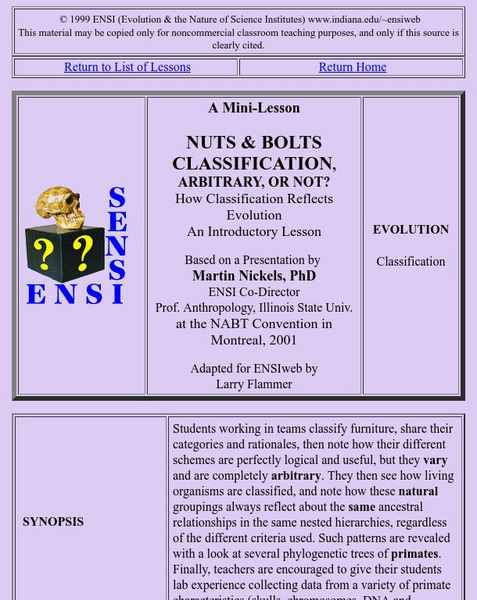Hi, what do you want to do?
E-learning for Kids
E Learning for Kids: Science: Caribbean Sea: Mexico: What Is Classifying?
Christina wants to classify all kinds of different things. Help her sort things into main groups.
Utah Education Network
Uen: Classify Yes, but Is It Alive?
Do you know the traits something that is alive? Test your knowledge of the traits of life by identifying objects as alive, not living, or once alive.
Alabama Learning Exchange
Alex: Taxonomy: The Importance of Classifying
This is a technology-based, hands-on Biology lesson used to introduce the topic of Taxonomy and the importance of classifying. Learners will listen to a podcast about classifying every living thing on Earth. Students will then give some...
Science Education Resource Center at Carleton College
Serc: Investigating Insects in Nature
In this lab, students will collect insects while making close observations of living things. They will then classify insects into seven common groups based on characteristics discussed in the classroom.
Science Education Resource Center at Carleton College
Serc: Using and Creating a Dichotomous Key
Students will investigate classification through a sorting activity and discus real-life evidence of classifying objects.
CPALMS
Florida State University Cpalms: Florida Students: Diagramming Diversity I
Identify how living organisms are classified according to their evolutionary history. Recognize how a hierarchical classification scheme can be used to classify living organisms based on physical characteristics.
ClassFlow
Class Flow: Living and Nonliving
[Free Registration/Login Required] Flipchart details characteristics of living and nonliving things, then asks students to classify. Activote questions are included.
Indiana University
Is Classification Arbitrary or Not?
Students transition from classifying furniture to an understanding of classification of living organisms in this thorough lesson plan site.
Soft Schools
Soft Schools: Classification Quiz
Take this interactive, multiple-choice quiz over classification of organisms, then review your score and any missed questions at the end.
Alabama Learning Exchange
Alex: Classification
This lesson will explain the reasons that society groups and classifies. The lesson has a hands-on component that helps learners connect everyday grouping with the way that scientists group and classify all living organisms.
CPALMS
Florida State University Cpalms: Florida Students: Diagramming Diversity Ii
Expand understanding of classification with this tutorial designed to help you learn how living organisms are classified according to their evolutionary history.
Michigan Reach Out
Reach Out Michigan: Being Alive
This site provides a basic lesson plan that classifies objects as alive or not alive. Good for early elementary.
Other
Science4 Us: Animals
In online and offline activities, students broaden their understanding of animals by learning to identify and classify animals into six categories: mammals, birds, fish, amphibians, reptiles, and invertebrates.
Other
Alternative Classifications of Life
The Linnaean system (1758) classified all macroscopic living organisms as either Animals or Plants, based on whether they moved [anima, with a soul] or not. Thus, Fungi were included as plants. With the invention of the microscope and...


















